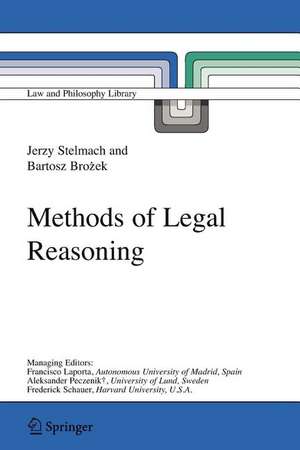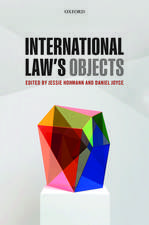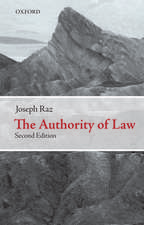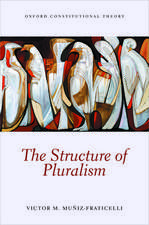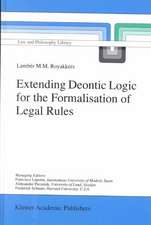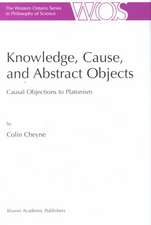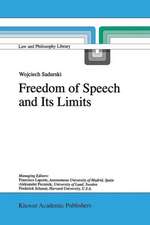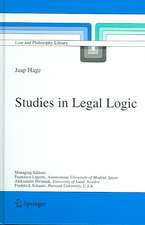Methods of Legal Reasoning: Law and Philosophy Library, cartea 78
Autor Jerzy Stelmach, Bartosz Brozeken Limba Engleză Paperback – 10 oct 2011
| Toate formatele și edițiile | Preț | Express |
|---|---|---|
| Paperback (2) | 643.99 lei 6-8 săpt. | |
| SPRINGER NETHERLANDS – 22 sep 2006 | 643.99 lei 6-8 săpt. | |
| SPRINGER NETHERLANDS – 10 oct 2011 | 1045.52 lei 6-8 săpt. |
Din seria Law and Philosophy Library
- 20%
 Preț: 813.11 lei
Preț: 813.11 lei - 20%
 Preț: 569.00 lei
Preț: 569.00 lei - 18%
 Preț: 1225.16 lei
Preț: 1225.16 lei - 18%
 Preț: 950.66 lei
Preț: 950.66 lei - 15%
 Preț: 583.43 lei
Preț: 583.43 lei - 15%
 Preț: 639.25 lei
Preț: 639.25 lei - 15%
 Preț: 641.53 lei
Preț: 641.53 lei - 18%
 Preț: 893.84 lei
Preț: 893.84 lei - 24%
 Preț: 797.39 lei
Preț: 797.39 lei - 15%
 Preț: 579.84 lei
Preț: 579.84 lei - 15%
 Preț: 644.95 lei
Preț: 644.95 lei - 18%
 Preț: 895.76 lei
Preț: 895.76 lei - 15%
 Preț: 644.95 lei
Preț: 644.95 lei - 20%
 Preț: 571.85 lei
Preț: 571.85 lei - 15%
 Preț: 642.03 lei
Preț: 642.03 lei - 18%
 Preț: 1232.26 lei
Preț: 1232.26 lei - 18%
 Preț: 1116.05 lei
Preț: 1116.05 lei - 15%
 Preț: 655.92 lei
Preț: 655.92 lei - 18%
 Preț: 833.54 lei
Preț: 833.54 lei - 18%
 Preț: 898.26 lei
Preț: 898.26 lei - 18%
 Preț: 1016.63 lei
Preț: 1016.63 lei -
 Preț: 390.25 lei
Preț: 390.25 lei - 24%
 Preț: 700.89 lei
Preț: 700.89 lei - 18%
 Preț: 999.60 lei
Preț: 999.60 lei - 18%
 Preț: 1115.77 lei
Preț: 1115.77 lei - 18%
 Preț: 1107.88 lei
Preț: 1107.88 lei - 15%
 Preț: 637.46 lei
Preț: 637.46 lei - 18%
 Preț: 781.94 lei
Preț: 781.94 lei - 24%
 Preț: 815.54 lei
Preț: 815.54 lei - 18%
 Preț: 786.18 lei
Preț: 786.18 lei - 18%
 Preț: 735.21 lei
Preț: 735.21 lei - 15%
 Preț: 653.33 lei
Preț: 653.33 lei - 18%
 Preț: 782.10 lei
Preț: 782.10 lei
Preț: 1045.52 lei
Preț vechi: 1275.03 lei
-18% Nou
Puncte Express: 1568
Preț estimativ în valută:
200.12€ • 217.45$ • 168.21£
200.12€ • 217.45$ • 168.21£
Carte tipărită la comandă
Livrare economică 21 aprilie-05 mai
Preluare comenzi: 021 569.72.76
Specificații
ISBN-13: 9789048172320
ISBN-10: 9048172322
Pagini: 244
Ilustrații: IX, 233 p.
Dimensiuni: 160 x 240 x 13 mm
Greutate: 0.35 kg
Ediția:2006
Editura: SPRINGER NETHERLANDS
Colecția Springer
Seria Law and Philosophy Library
Locul publicării:Dordrecht, Netherlands
ISBN-10: 9048172322
Pagini: 244
Ilustrații: IX, 233 p.
Dimensiuni: 160 x 240 x 13 mm
Greutate: 0.35 kg
Ediția:2006
Editura: SPRINGER NETHERLANDS
Colecția Springer
Seria Law and Philosophy Library
Locul publicării:Dordrecht, Netherlands
Public țintă
Professional/practitionerCuprins
Part I. Controversy over legal methodology in the 19th and 20th centuries. 1. Three stances. 2. Methods of legal reasoning. 3. Logic – analysis – argumentation – hermeneutics.- Part II. Logic. 1. Introduction. 2. Classical logic: propositional logic and first order predicate logic. 3. Deontic logic. 4. Logic of action and logic of norms. 5. Defeasible logic. 6. Summary.- Part III. Analysis. 1. Introduction. 2. Linguistic analysis. 3. Economic analysis of law. 4. Summary.- Part IV. Argumentation. 1. Introduction. 2. Two conceptions of a legal discourse. 3. Legal argumentation.- Part V. Hermeneutics. 1. Introduction. 2. Hermeneutics as epistemology. 3. Hermeneutics as ontology. 4. The understanding of the law.- Part VI. Methods of legal reasoning from a post-modern perspective. 1. A summary. 2. Dilemmas of the contemporary philosophy of law. 3. The epistemological approach. 4. Unfinished projects.
Textul de pe ultima copertă
The book attempts to describe and criticize four methods used in legal practice, legal dogmatics and legal theory: logic, analysis, argumentation and hermeneutics. Apart from a presentation of basic ideas connected with the above mentioned methods, the essays contained in this book seek to answer questions concerning the assumptions standing behind these methods, the limits of using them and their usefulness in the practice and theory of law. A specific feature of the book is that in one study four different, sometimes competing concepts of legal method are discussed. The panorama, sketched like this, allows one to reflect deeply on the questions concerning the methodological conditioning of legal science and the existence of a unique, specific legal method. The authors argue that there exists no such method. They claim that the methodologies presented in the book may serve as a basis for constructing a coherent and useful conception of legal thinking. Any such conception, however,must recognize its own assumptions and limitations, resulting from adopting a specific philosophical stance.
Caracteristici
The only book that covers four major philosophies of legal reasoning (logic, analysis, argumentation, hermeneutics) Shows the philosophical basis for any theory of legal reasoning Reports interdisciplinary research (philosophy, theory of law, economics, legal dogmatics) Combines the perspectives of Anglo-American and continental legal theory Covers topics which are less known and explored in the English literature
